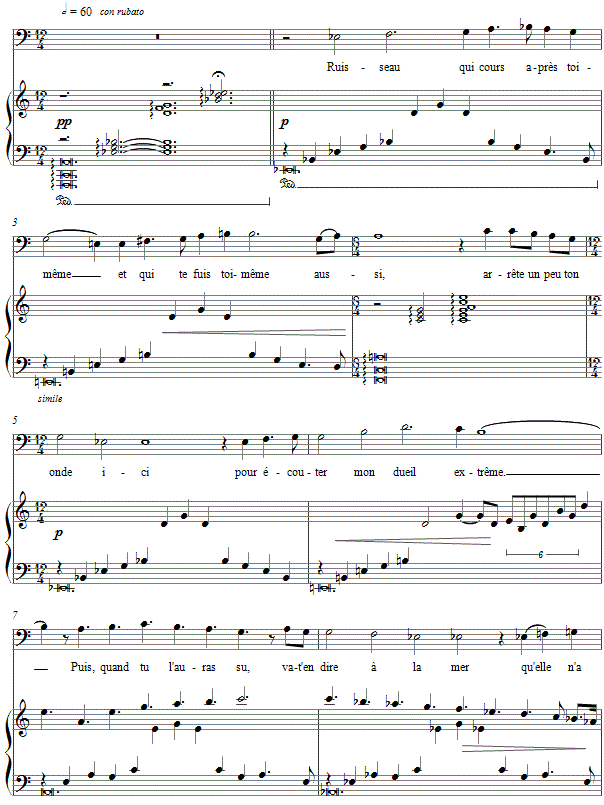Music and Texts of GARY BACHLUND
Vocal Music | Piano | Organ | Chamber Music | Orchestral | Articles and Commentary | Poems and Stories | Miscellany | FAQs
Plainte - (2011)
Marc-Antoine Girard de Saint-Amant
for baritone and piano
for Edwin Crossley-Mercer
Ruisseau qui cours après toi-même
Et qui te fuis toi-même aussi,
Arrête un peu ton onde ici
Pour écouter mon deuil extrême.
Puis, quand tu l'auras su, va-t'en dire à la mer
Qu'elle n'a rien de plus amer.
Raconte-lui comme Sylvie,
Qui seule gouverne mon sort,
A reçu le coup de la mort
Au plus bel âge de la vie,
Et que cet accident triomphe en même jour
De toutes les forces d'Amour.
Las ! je n'en puis dire autre chose,
Mes soupirs tranchent mon discours.
Adieu, ruisseau, reprends ton cours
Qui, non plus que moi, se repose ;
Que si, par mes regrets, j'ai bien pu t'arrêter,
Voici des pleurs pour te hâter.[ 4 apges, circa 3' 30" ]
Marc-Antoine Girard de Saint-Amant
Antoine Girard Saint-Amant (1594-1661): "a poet, born at Rouen, the son of a naval officer. He was the companion of the comte d'Harcourt, whom he accompanied on his campaigns and in a mission to England in 1643, and later a follower of Marie de Gonzague, Queen of Poland. He was a freethinker and poet. He was an original member of the Académie. [details in The Oxford Companion to French Literature, compiled and edited by Sir Paul Harvey and J. E. Heseltine, Oxford: 1959].
Complaint
Stream, as you tumble over yourself
As you know yourself to be,
Pause your rippling a moment
To hear my deep despair.
Then when you know,
You will go and say to the sea --
There is nothing more bitter.
Tell it of Sylvie,
Who alone governs my fate,
Who was struck down by death
In the prime of life.
And triumphed that day in this accident
All the forces of Love.
Alas! I can say nothing more;
My sighs mute my speech.
Farewell, stream, take up your path
Which more than me understands.
As my sorrow has truly held you back,
Here are more tears to hurry you on.
paraphrase by gb
The setting is a standard song form, ABA, of shifting harmonic colors alongside shifting rhythmic divisions of the underlying meter, as at measure 7 and thereafter. Moving quarters contrast against moving dotted quarters, and later whole notes against dotted whole notes.
The score for Plainte is available as a free PDF download, though any major commercial performance or recording of the work is prohibited without prior arrangement with the composer. Click on the graphic below for this piano-vocal score.

